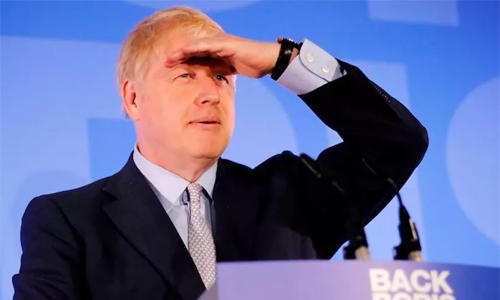Luck will not be enough for the UK’s next prime minister
There is no precise formula for success in politics. It’s a peculiar alchemy of talent, tenacity, temperament and timing. The British Conservative party is now in the middle of a messy leadership race, which will result in its third prime minister in three years. The apparent favourite is the former foreign secretary Boris Johnson, but why some people succeed while other, better candidates fail remains a puzzle.
The US Supreme Court Justice Oliver Wendell Holmes famously observed that President Franklin Roosevelt owed his success to “a second-class intellect, but a first-class temperament.” In his famous radio “fireside chats”, Roosevelt certainly showed that he understood how to communicate with ordinary Americans. Some British political observers believe that Boris Johnson is likely to become our next prime minister because he is also, in some way “relatable”. Mr Johnson’s personal life, even his appearance, seems chaotic, which perhaps makes us feel better about our own foibles. Showing a degree of humanity in politics definitely is useful.
The UK’s outgoing prime minister Theresa May was noted for her tenacity, but she was so distant and cold that she frequently appeared robotic. When faced with the prospect of meeting victims of the disastrous fire at Grenfell Tower building in London, two years ago, she couldn’t manage to do what most of us would have done and console them. Bill Clinton, on the other hand, and Barack Obama were leaders of first-class intellects who proved themselves to be big on empathy, too. The first major politician I ever met was a far-right British Conservative, Enoch Powell. Powell was talented – a former army brigadier, who rose through the ranks, and a professor of classics.
However, he is best known for his appalling comments about race relations in Britain. He was sacked and ended his career a kind of exile in Northern Ireland. He wrote: “All political lives, unless they are cut off in midstream at a happy juncture, end in failure, because that is the nature of politics and of human affairs.” When I interviewed Powell, he made what I thought was a much sharper observation. He said that while politicians reach the level of the top table of government, in the Cabinet as senior ministers, owing to talent, they get to be leaders because of luck. Many talented, tenacious and thoughtful politicians get near the top but do not quite make it.
William Hague, now Lord Hague, was leader of the British Conservative party for a time. His misfortune was that his time was 1997 to 2001, the years when Tony Blair strode the world political stage. Hague got nowhere and quit. Then there is Ed Miliband, a very intelligent, talented man and one-time leader of the British Labour party. In May 2015, during a very tough general election campaign which many people – including his closest advisers – expected Miliband to win, the Conservative leader David Cameron Tweeted: “Britain faces a simple and inescapable choice – stability and strong Government with me, or chaos with Ed Miliband.” Miliband lost.
Cameron won by a healthy margin. Ironically, it was Cameron who provided anything but stability and strong government, as the EU referendum and the fiasco in which Britain now finds itself embroiled. And so the time has come for another British leader to face the same key problem: Brexit. Boris Johnson has the air of a man who has been seeking the job of prime minister since birth. It may be his time. He is lucky his enemies and rivals are generally a lacklustre bunch prone to reciting dull-witted cliches. Luck and timing may help Johnson as it did Emmanuel Macron in France and Donald Trump in the United States. Neither man would have reached the presidency of their countries a decade ago.
But being something – in these cases, prime minister or president – is not the same as doing something. Mr Johnson has been the mayor of London and foreign secretary, without significant achievements in either job. If he becomes prime minister he inherits a deeply divided country in which voters are shocked at the failures of government. Moreover, he has promised to “deliver” Brexit, but that is not like delivering a baby. Stop 10 British people in the street and ask what “Brexit” means to them and they will offer 10 different, often mutually exclusive, definitions.
I’m not worried that the career of Britain’s next prime minister will end in failure. I am worried that, with the next Brexit deadline set for October 31, the next prime minister’s career will begin in failure. The clock is ticking. Making a “success” of Brexit may not even be possible and, right now, it appears that luck is no longer enough. Being honest about the difficulties ahead would be a good place to start.
Related Posts

